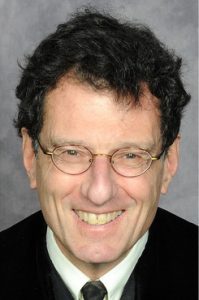Judge Orders Opioid Lawyers to Come Up With a Settlement Plan
The federal judge overseeing about 200 opioid lawsuits ordered lawyers into private talks on Tuesday with one goal in mind: find a way to settle the cases, and quickly.
January 09, 2018 at 04:37 PM
6 minute read
 U.S. District Judge Dan Polster of the Northern District of Ohio.
U.S. District Judge Dan Polster of the Northern District of Ohio. The federal judge overseeing about 200 opioid lawsuits ordered lawyers into private talks on Tuesday with one goal in mind: find a way to settle the cases, and quickly.
U.S. District Judge Dan Polster of the Northern District of Ohio told a packed Cleveland federal courtroom that he wanted to avoid protracted discovery fights and trials in the multidistrict litigation. His focus was to get the parties to come up with a way to resolve all the opioid litigation this year.
“My objective is to do something meaningful to abate this crisis, and to do it in 2018,” Polster said. “With all these smart people and their clients, I'm confident we can do something to dramatically reduce the number of opioids that are being disseminated, manufactured and distributed.”
After the hearing, Polster ordered plaintiffs lawyers into one courtroom, and defense counsel in another, to use for private conferences.
The Judicial Panel on Multidistrict Litigation last month assigned Polster, an appointee of President Bill Clinton, to oversee the federal cases. Polster has been on the bench in the Northern District of Ohio for 20 years.
➤➤ Get updates on the opioid MDL and other mass tort litigation straight to your in-box with Critical Mass from Law.com. Learn more and sign up here.
On Thursday, he approved a leadership team of 22 lawyers to spearhead lawsuits in federal court, most filed by cities and counties across the nation. The team reads like a “Who's Who” in mass torts and includes many of the same lawyers who obtained the $246 billion settlement with Big Tobacco. In proposing the slate, plaintiffs lawyers included an organizational chart that showed various committees and working groups, overseen by a plaintiffs steering committee—all of which would require more attorneys to be appointed in leadership posts.
Polster acknowledged proposals from lawyers on both sides on how to structure the MDL. But he had different plans.
“I've given a lot of thought to what to do,” he said. “All of the submissions focused on how a judge could manage this MDL and the 200 or more cases in sort of the traditional manner. I've appreciate[d] this. I've handled and managed two other MDLS and I'm familiar with many of the others handled around the country. But this is not a traditional MDL.”
He said parties on both sides—opioid manufacturers and distributors, and the cities and counties that are suing them—are responsible for the opioid health crisis.
“I did a little math,” he said. “We're losing more than 50,000 of our citizens every year, about 150 Americans are going to die today, just today, while we're meeting. And my humble opinion is everyone shares some of the responsibility, and no one has done enough to abate it.”
He also questioned the appropriateness of having his courtroom be the venue for halting an epidemic.
“Ideally, this should be handled by the legislative and executive branches, our federal government and state government,” he said. “They haven't seemed to have done a whole lot. So, it's here.”
Polster said he isn't interested in “a whole lot of finger-pointing,” discovery, trials or answers to “interesting legal questions.” Should the lawyers fail to come up with a plan on how to reach an agreement, he would “turn everyone loose” to “tear each other upside down,” then have a trial in 2019 in Ohio, he said.
“What that will accomplish, I don't know,” he said. “But I'd rather not do that.”
At the hearing, many lawyers insisted that reaching a settlement was their goal, but there were several challenges. Joe Rice of Motley Rice, one of three lead plaintiffs counsel, said a pharmaceutical sales database maintained by the Drug Enforcement Administration would help guide them. “It is a piece of information that would be extremely valuable to the court and all the parties,” he said.
Another lead plaintiffs counsel, Paul Farrell, of West Virginia's Greene, Ketchum, Farrell, Bailey & Tweel, had sought that database as part of the city of Cincinnati's opioid case—a request that the U.S. Attorney's Office in Columbus objected to as overly broad and burdensome. The case was then transferred to Polster's courtroom.
Purdue Pharma attorney Mark Cheffo, a New York partner at Quinn Emanuel Urquhart & Sullivan, speaking on behalf of the manufacturers, said another issue was “making sure that the right folks are at the table, and many of them aren't in this room.” Dozens of opioid lawsuits have been filed in state courts, including those by attorneys general.
Polster responded: “I can pick up the phone and call any state attorney general I want and invite him or them to be involved, and I'm sure they will,” he said. “They've got the same interest.”
And while he acknowledged he didn't “control the DEA or the FDA [Food and Drug Administration],” he said he could invite them to participate—though Polster, a former trial attorney in the U.S. Department of Justice's Antitrust Division, said he wasn't inclined to interfere with a DOJ investigation just to get the database.
Polster earlier had indicated he would bring in a special master, or special masters, into the case. But at Tuesday's hearing, he said he hadn't decided on whom. He said he had preliminary discussions with three people, including David Cohen, a special master in Cleveland, and Duke Law School professor Francis McGovern.
“What I'm interested in doing is not just moving money around,” he said. “This is an ongoing crisis. What we've got to do is dramatically reduce the number of pills that are out there and make sure the pills that are out there are being used properly because we all know that a whole lot of them have gone walking, and with devastating results. And that's happening right now.”
This content has been archived. It is available through our partners, LexisNexis® and Bloomberg Law.
To view this content, please continue to their sites.
Not a Lexis Subscriber?
Subscribe Now
Not a Bloomberg Law Subscriber?
Subscribe Now
NOT FOR REPRINT
© 2025 ALM Global, LLC, All Rights Reserved. Request academic re-use from www.copyright.com. All other uses, submit a request to [email protected]. For more information visit Asset & Logo Licensing.
You Might Like
View All


Big Tech Is Cozying Up to President Trump. Here's Why Their Lawyers Are Cautiously Optimistic

Supreme Court Agrees to Hear Lawsuit Over FBI Raid at Wrong House
Trending Stories
- 1In Novel Oil and Gas Feud, 5th Circuit Gives Choice of Arbitration Venue
- 2Jury Seated in Glynn County Trial of Ex-Prosecutor Accused of Shielding Ahmaud Arbery's Killers
- 3Ex-Archegos CFO Gets 8-Year Prison Sentence for Fraud Scheme
- 4Judges Split Over Whether Indigent Prisoners Bringing Suit Must Each Pay Filing Fee
- 5Law Firms Report Wide Growth, Successful Billing Rate Increases and Less Merger Interest
Who Got The Work
J. Brugh Lower of Gibbons has entered an appearance for industrial equipment supplier Devco Corporation in a pending trademark infringement lawsuit. The suit, accusing the defendant of selling knock-off Graco products, was filed Dec. 18 in New Jersey District Court by Rivkin Radler on behalf of Graco Inc. and Graco Minnesota. The case, assigned to U.S. District Judge Zahid N. Quraishi, is 3:24-cv-11294, Graco Inc. et al v. Devco Corporation.
Who Got The Work
Rebecca Maller-Stein and Kent A. Yalowitz of Arnold & Porter Kaye Scholer have entered their appearances for Hanaco Venture Capital and its executives, Lior Prosor and David Frankel, in a pending securities lawsuit. The action, filed on Dec. 24 in New York Southern District Court by Zell, Aron & Co. on behalf of Goldeneye Advisors, accuses the defendants of negligently and fraudulently managing the plaintiff's $1 million investment. The case, assigned to U.S. District Judge Vernon S. Broderick, is 1:24-cv-09918, Goldeneye Advisors, LLC v. Hanaco Venture Capital, Ltd. et al.
Who Got The Work
Attorneys from A&O Shearman has stepped in as defense counsel for Toronto-Dominion Bank and other defendants in a pending securities class action. The suit, filed Dec. 11 in New York Southern District Court by Bleichmar Fonti & Auld, accuses the defendants of concealing the bank's 'pervasive' deficiencies in regards to its compliance with the Bank Secrecy Act and the quality of its anti-money laundering controls. The case, assigned to U.S. District Judge Arun Subramanian, is 1:24-cv-09445, Gonzalez v. The Toronto-Dominion Bank et al.
Who Got The Work
Crown Castle International, a Pennsylvania company providing shared communications infrastructure, has turned to Luke D. Wolf of Gordon Rees Scully Mansukhani to fend off a pending breach-of-contract lawsuit. The court action, filed Nov. 25 in Michigan Eastern District Court by Hooper Hathaway PC on behalf of The Town Residences LLC, accuses Crown Castle of failing to transfer approximately $30,000 in utility payments from T-Mobile in breach of a roof-top lease and assignment agreement. The case, assigned to U.S. District Judge Susan K. Declercq, is 2:24-cv-13131, The Town Residences LLC v. T-Mobile US, Inc. et al.
Who Got The Work
Wilfred P. Coronato and Daniel M. Schwartz of McCarter & English have stepped in as defense counsel to Electrolux Home Products Inc. in a pending product liability lawsuit. The court action, filed Nov. 26 in New York Eastern District Court by Poulos Lopiccolo PC and Nagel Rice LLP on behalf of David Stern, alleges that the defendant's refrigerators’ drawers and shelving repeatedly break and fall apart within months after purchase. The case, assigned to U.S. District Judge Joan M. Azrack, is 2:24-cv-08204, Stern v. Electrolux Home Products, Inc.
Featured Firms
Law Offices of Gary Martin Hays & Associates, P.C.
(470) 294-1674
Law Offices of Mark E. Salomone
(857) 444-6468
Smith & Hassler
(713) 739-1250








